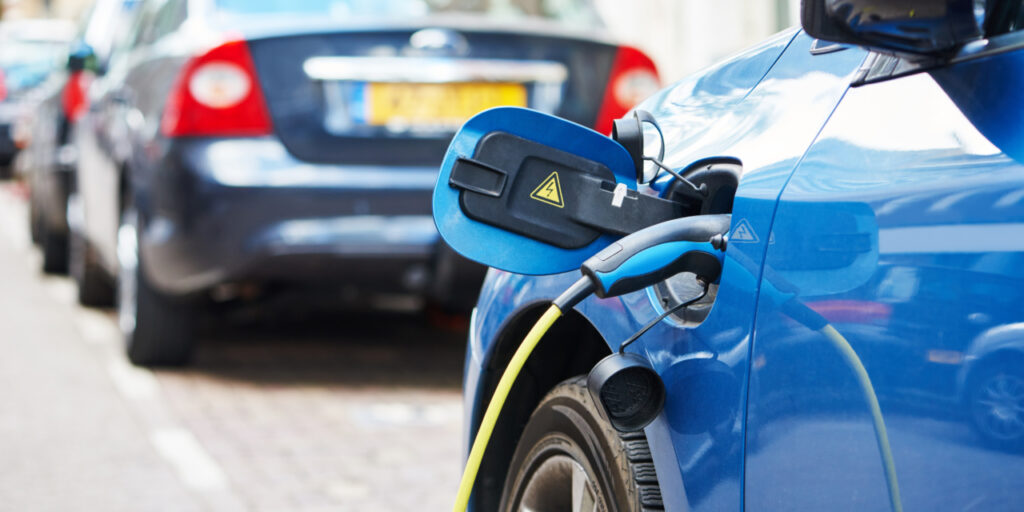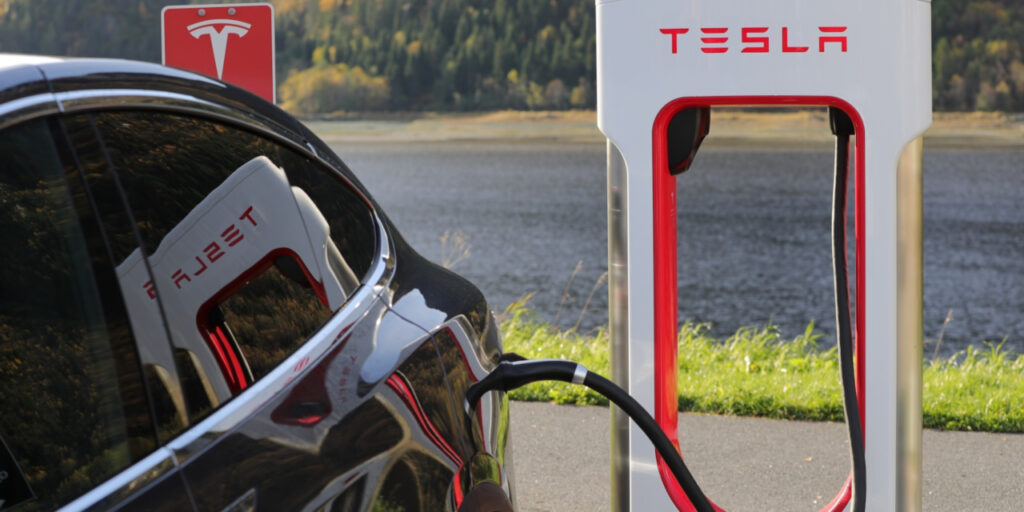The key factors when choosing an electric vehicle, include price, size and practicality and availability. Make an informed decision and find the perfect EV for you.
Where should I go to buy it?
You can visit a car dealership and purchase a brand-new EV, or you can lease one through a leasing company. Just like with traditional cars, you have the option to buy or lease.
If you’re looking for a used EV, there are several traditional car sales outlets that carry them, such as franchised dealerships and independent dealers. When shopping for a used EV, look for a retailer that’s certified through the Electric Vehicle Approved (EVA) scheme. This scheme is run by the National Franchised Dealers Association and is audited by the Energy Saving Trust and the Government’s Office for Zero Emission Vehicles, ensuring that you’re working with a retailer that has expertise in EVs.
Now, if you’re interested in Tesla, keep in mind that they have a unique sales model and most of their sales are conducted online. Other car manufacturers are also starting to adopt this approach, so you may be able to find other new EVs online as well.
What is the Right Used Electric Vehicle for You?
Before purchasing a used EV, it is essential to research the driving range of various models and make sure the range meets your driving needs. A good rule of thumb is to choose an EV with a range that is at least 20-30% higher than your average daily commute, to allow for unexpected driving needs and unexpected circumstances.
Consider the charging infrastructure in your area and how often you’ll need to charge the vehicle, so you can select the right EV with the range you need.
Additionally, it’s worth noting that real-world driving range can vary greatly depending on factors such as driving style, road conditions, weather, and usage of the vehicle’s features such as air conditioning. To get a more accurate idea of the driving range of an EV, consider checking out reviews from trusted sources and talking to current EV owners.

List prices
Start by researching the list prices of the EV models that you’re interested in. Keep in mind that EVs may have a higher upfront cost compared to petrol-powered vehicles, so it’s important to compare the prices of different models.
Financing options
Some automakers offer financing or leasing options that can make it more affordable to purchase an EV. Look into these options to see if they align with your budget.
Consider charging options
Another important factor to consider is the charging options for your EV. If you have access to a home charging station, charging your EV overnight can be convenient and cost-effective. However, if you’ll be relying on public charging stations, it’s important to consider the availability and accessibility of charging stations in your area.
Charging speed
In addition to considering the charging options, think about the charging speed. The charging speed of an EV is measured in kilowatts (kW) and can vary depending on the vehicle model and charging method. Faster charging speeds can be more convenient, but also more expensive.
Public charging networks
If you plan to use public charging networks, research the charging networks that are available in your area and their compatibility with the EV you’re considering. Some networks offer more charging options and faster charging speeds than others.
Another factor to consider is the charging time for your electric vehicle. Some models have a longer charging time than others, so if you’re planning on making long trips, look for a model that offers fast charging options. With fast charging, you can recharge your battery in a much shorter amount of time, allowing you to get back on the road more quickly. Additionally, be sure to check the availability of fast-charging stations near you, as not all areas may have access to fast-charging.

What else might be added to the cost?
Consider the cost of the EV and its associated charging equipment and installation. The upfront cost of an EV may be higher than a traditional petrol vehicle, but the operating costs, such as fuel and maintenance, can be lower in the long run. It’s important to weigh the upfront cost against the potential cost savings over time to determine if an EV is the right choice for you.
Warranties for Peace of Mind
Be Sure to Check Your Electric Car’s Battery Coverage. With many manufacturers offering warranties of up to 8 years or 100,000 miles, you can drive with confidence knowing your battery is protected. However, it’s important to keep in mind that some brands may offer different coverage periods, so be sure to double-check before making a purchase.
Before making your final decision, it’s a good idea to read through the terms of the warranty carefully. Some warranties only cover the cost of a new battery, while others may also include labour costs. Additionally, some manufacturers offer extended warranties or maintenance plans that can provide additional protection for the battery and other parts of the vehicle.
Take a look at the battery warranties and terms of different EV models to find the one that meets your needs and provides the best coverage. By taking the time to research your options, you can be confident in your purchase and hopefully, won’t be hit with unexpected costs in the years to come!
Battery health systems
These systems can keep track of your battery’s performance and alert you when it’s time for a replacement. Some manufacturers also offer battery degradation compensation, meaning they’ll provide financial compensation if your battery degrades before the end of the warranty. Choose an EV with a battery warranty that meets your needs and provides the best coverage for your investment.
Driving habits
Your driving habits and style can also impact your choice of an EV. For example, if you frequently drive on highways or make long road trips, you may want to consider an EV with a longer driving range. On the other hand, if you mostly drive short distances, a vehicle with a shorter driving range may be suitable.
The operating costs of EVs, such as fuel and maintenance expenses, tend to be lower than those of internal combustion engine (ICE) vehicles. Do some research to compare the running costs of different EV models.
Servicing Options
When choosing an electric vehicle (EV) based on model availability and practicality, it’s important to consider the availability of the model in your area, as well as the servicing and maintenance options available. Here’s what to keep in mind:
Consider the servicing and maintenance options available for the EV models you’re interested in. Make sure there are authorised service centres nearby that can provide maintenance and repairs as needed.
Parts availability
Ensure that parts for the model you’re interested in are readily available in your area, so you don’t face long waiting times or extra costs for repairs or maintenance.
Aftermarket support
Consider if the model you’re interested in has more aftermarket support, meaning you may have more options for customisation and upgrades.
Breakdown Cover in the UK
Owning an electric vehicle comes with its own set of challenges, including unexpected breakdowns. That’s why it’s important to have reliable EV breakdown cover. Top providers in the UK offer specialized support for electric vehicles, including charging assistance, battery issues, and more.
Choose from some of the best options available, including the RAC, Green Flag, and AA. Invest in peace of mind and keep yourself protected on the road. Drive with confidence with the best EV breakdown cover in the UK.

Features and Capabilities
Consider the vehicle’s features and capabilities, such as the number of seats, the presence of a tow bar, and the vehicle’s load-carrying capacity.
Size and Space
Take a look at the size and interior space of the EV models you’re interested in. If you have a big family or need to transport lots of cargo, consider a larger vehicle with more room. If you often transport large items, make sure to check the available cargo space, including the size of the trunk and fold-down rear seats.
Practicality-enhancing features
Look for features that enhance the practicality of the vehicle, like adaptable air suspension, hill-descent control, and off-road capability.
Towing Capacity
If you need to tow a trailer or boat, make sure to check the vehicle’s towing capacity and if it can handle your desired load.
Resale value
Another factor to consider is resale value. EVs tend to hold their value well, so it may be worth checking the resale value of the models you’re interested in.
By considering these factors, you’ll be able to choose an EV that meets your needs and fits your budget. It’s also important to consider the long-term savings in running costs and the potential increase in resale value.
When evaluating the cost of an electric vehicle (EV), it’s important to take into account both the initial price and any government incentives that may be available. It’s worth noting that EVs may have a higher upfront cost compared to petrol-powered vehicles, so it’s important to carefully weigh the factors involved in your decision-making process.
